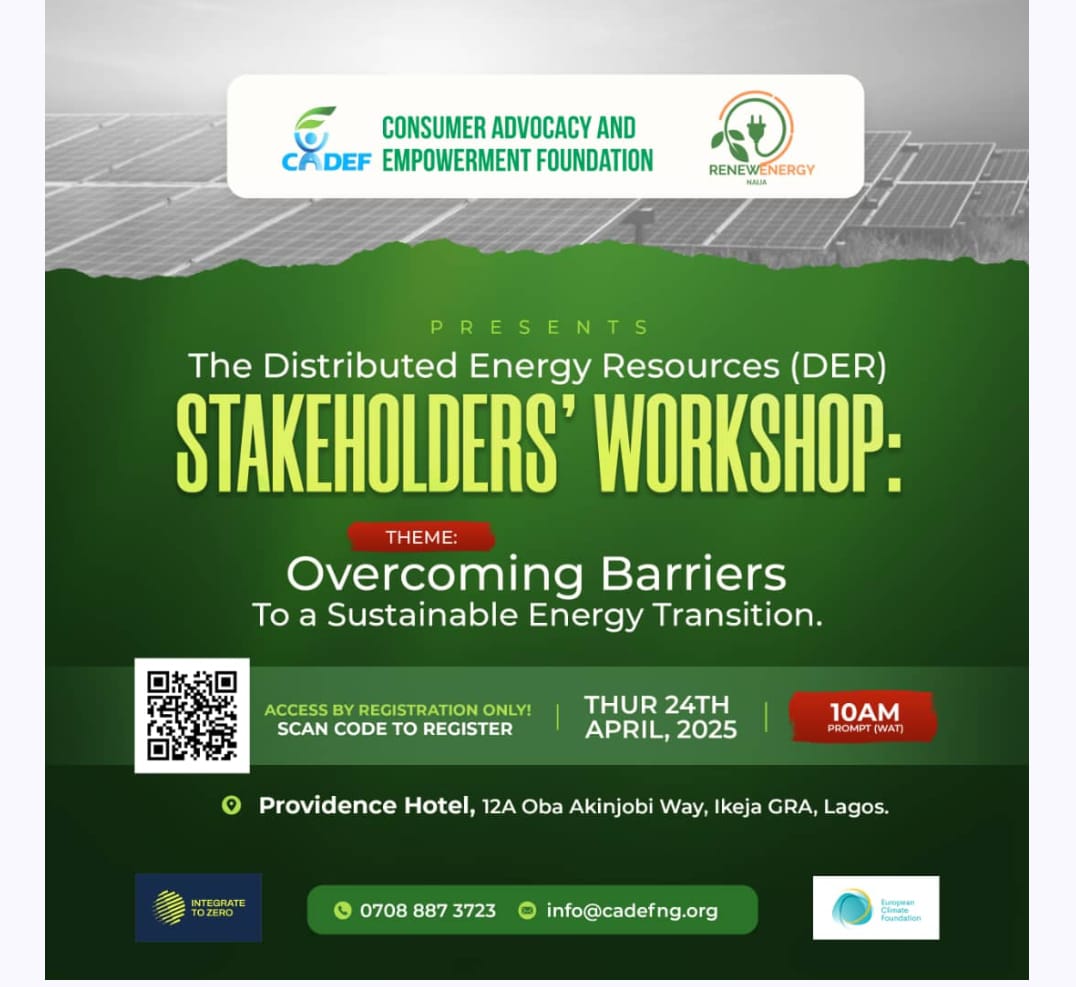News
CADEF Hosts Workshop to Drive Distributed Energy Solutions in Nigeria

Consumer Advocacy and Empowerment Foundation (CADEF) a leading not for profit organisation in consumer rights and advocacy in Nigeria has announced a high-level Distributed Energy Resources (DER) Stakeholders’ Workshop scheduled to hold on Thursday, April 24, 2025, at The Providence Hotel, Ikeja GRA, Lagos.

Themed “Overcoming Barriers to a Sustainable Energy Transition”, the workshop aims to provide a platform for robust dialogue and action among policymakers, energy sector experts, investors, development partners, and clean energy advocates.
The Federal Government of Nigeria had in May 2015 approved the National Renewable Energy and Energy Efficiency Policy (NREEEP) as well as the National Determined Contribution (NDC), 2015, which seeks to increase the share of on-grid renewable energy in the total electricity supply from 1.3% in 2015 to 30% in 2030.
As Nigeria pursues its Vision 30:30:30 to generate 30,000MW of electricity by the year 2030, with 30% from renewable energy, CADEF with other experts in the sector will through the stakeholders workshop provide practical and scalable DER solutions, with sessions addressing access to Solar Financing and Investment Opportunities, DER integration strategies and grid resilience, policy and regulatory developments, emerging technologies and case studies.
Speaking ahead of the event, Prof. Chiso Ndukwe-Okafor, Executive Director of Consumer Advocacy and Empowerment Foundation (CADEF), stated: “This workshop is not just about dialogue, it’s about driving action. Distributed energy resources hold the key to unlocking sustainable and inclusive energy access, especially for underserved communities. Through this engagement, we aim to foster cross-sector collaboration and equip stakeholders with the tools and insights needed to scale solutions that work.”
Participants will gain first-hand insights from trailblazers in the clean energy space, while shaping policy and investment discourse on Nigeria’s energy transition. With a rapidly growing demand for reliable electricity, DER technologies such as solar mini-grids, battery storage, and hybrid systems are increasingly vital for Nigeria’s energy mix.
Lovelyn Okafor, CADEF’s Director of Programmes, emphasized the significance of the workshop: “The time is ripe to leverage distributed energy innovations to build a resilient and inclusive energy future. We are bringing together voices that matter, from grassroots change-makers to top-tier investors and government officials to spark lasting transformation.”
Consumer Advocacy and Empowerment Foundation has been at the fore, driving change in the renewable energy sector through some key innovative interventions such as the unveiling of the Distributed Energy Resources (DER) one-stop shop at der.cadefng.org in 2024, a digital platform created to revolutionize how stakeholders and businesses across the DER ecosystem perceive, access and manage energy solutions.
CADEF also announced the launch of the greenlabs programme in collaboration with Jacob’s Ladder Africa, an initiative designed to inspire, equip, and empower young Nigerians to create sustainable, climate-smart solutions that address critical environmental and socio-economic challenges.
Sessions during the workshop will include a live demonstration of the newly launched DER platform (Renew Energy Naija) at DER.CADEFNG.ORG, panel discussions on financing and incentives, public-private partnerships and international collaborations.
CADEF believes that by strengthening multi-stakeholder collaboration, Nigeria can unlock the full potential of decentralized renewable energy, boost energy access, and empower millions of underserved households and businesses.
The workshop is strictly by confirmed registration and part of CADEF’s broader commitment to advancing energy equity and sustainability through advocacy, innovation, and capacity building.
For inquiries or partnership opportunities, please contact: info@cadefng.org | +234 (0) 7088873723
News
Abbas Jega, Ex-AMCON ED, Testifies, Says Arik Never Cooperated With AMCON

A former Executive Director at Asset Management Corporation of Nigeria (AMCON), Abbas Muhammed Jega, has shed light on the financial dealings between Arik Air and Union Bank, revealing that the airline’s debt to AMCON was over N100 billion as of 2015 and remained unpaid.

Testifying as the third prosecution witness in the ongoing trial of Ahmed Kuru, former AMCON MD/CEO, and four others, Jega disclosed that AMCON acquired Arik’s loans from Union Bank and Keystone Bank, but not Zenith Bank, which was purchased after his exit.
According to Jega, AMCON discovered in a London meeting that Union Bank had sold them a guarantee rather than a loan, which was meant to cover foreign lenders in case Arik defaulted.
“We invited Arik to resolve the issue with Union Bank, but the arrangement disclosed by me never existed,” Jega said.
Jega attributed Arik’s inability to repay to over-trading, which led to their inability to service existing debts. He revealed that AMCON attempted to restructure Arik’s debt and even offered additional loan facilities to help the airline with working capital problems.
However, Arik failed to meet repayment obligations, prompting AMCON to propose two solutions: a debt equity swap and management control. Both options were rejected or delayed by Arik.
Under cross-examination, Jega confirmed that Kamilu Omokide and Captain Roy Ilegbodu played no role in the loan purchase or London meeting.
The matter has been adjourned to June 30, July 1, and July 2, 2025, for further cross-examination.
The case involves alleged financial misappropriation amounting to N76 billion and $31.5 million, with Ahmed Kuru, Kamilu Omokide, Captain Roy Ilegbodu, Union Bank Ltd, and Super Bravo Ltd as defendants, presided over by Justice Mojisola Dada.
News
Minister of Information to Chair GOCOP Book Launch in Abuja

Alhaji Mohammed Idris, Minister of Information and National Orientation is to chair the public presentation of the book Nigeria Media Renaissance: GOCOP Perspective on Online Publishing, a publication of Guild of Corporate Online Publishers (GOCOP). The event is scheduled for 110am on Tuesday June 17, 2025 at the Continental Hotel, Abuja.

President of GOCOP, Maureen Chigbo, who confirmed this development said the book presentation will be graced by eminent personalities from all walks of life, including government officials, captains of industry, media practitioners and other professionals, representatives of international organisations, directors of non-governmental organisations.
Alhaji Idris was sworn in as Minister of Information and National Orientation on August 21, 2023, following his appointment by President Bola Ahmed Tinubu. With over three decades of experience in broadcasting, newspapering, public relations, and advertising, Idris has brought a wealth of expertise to the role.
His academic background includes degrees in English Studies from Uthman Danfodio University, Sokoto, and Bayero University, Kano. As an entrepreneur, he established notable media outlets such as Blueprint, WE FM radio station, and Rapid Television in Abuja.
He is a prominent figure in professional associations such as National Institute of Public Relations, African Public Relations Association, Public Relations Consultants Association of Nigeria, and Newspaper Proprietors Association of Nigeria.
As the founder of Bifocal Communications, a leading public relations and communications consultancy, Idris has served both local and transnational corporations.
Beyond his professional endeavours, Idris is committed to social responsibility through the Mohammed Idris Malagi (MIM) Foundation, which has positively impacted many lives. As a reward for his contributions to the development of his immediate environment and beyond, The Etsu Nupe conferred “Kaakaki Nupe” on him.
A press statement by the GOCOP Publicity Secretary, Ogbuefi Remmy Nweke, quoted the GOCOP president as saying that the proceeds of the book will be used to fund the N2.3 billion GOCOP MEDIA CENTRE, a multi-purpose resource centre comprising a secretariat, a 21st Century library and event halls, among others.
Nweke further noted that the Guild of Corporate Online Publishers (GOCOP) was established to promote professionalism in online publishing, ensuring its members uphold the fundamental principles of journalism.
Comprising seasoned editors and senior journalists with distinguished career in print and electronic media, GOCOP’s membership has traversed the online publishing, recognizing its pivotal role in shaping the future of journalism globally. With 120 corporate publishers as members, GOCOP continues to uphold the highest standards of online journalism.
News
ARCON to Crackdown on AI-Generated Fake Ads

Advertising Regulatory Council of Nigeria (ARCON) has issued a stern warning to marketers, content creators, and social media influencers amid an alarming rise in fraudulent, AI-generated advertisements circulating across digital platforms.

Dr. Olalekan Fadolapo, director-general, ARCON, during a press briefing at its Lagos headquarters, decried the “porous” state of Nigeria’s online ad ecosystem and pledged to prosecute offenders to the fullest extent of the law.
Dr. Fadolapo opened the media parley by highlighting how easily unscrupulous operators deploy artificial intelligence tools to produce convincing—but entirely fabricated—advertisements.
“Our social media space has become so porous that people now freely post fake adverts, some of which claim outrageous and bogus benefits,” he remarked.
According to the Director-General, these deceptive campaigns often promise “miraculous cures” or “guaranteed returns” without any credible data or verifiable sources to back them.
Among the most alarming examples cited was an herbal remedy advertisement alleging to cure over 200 ailments—ranging from HIV to cancer—through a single “miracle” concoction.
“Imagine an advert claiming that a single herbal drug could cure HIV, cancer, and more than 200 other diseases,” Dr. Fadolapo said.
ARCON’s DG emphasized that such misleading advertisements not only jeopardize public health—by luring vulnerable individuals into purchasing untested or harmful products—but also undermine consumer confidence in legitimate businesses operating within advertising guidelines.
Dr. Fadolapo pointed to the regulatory vacuum that allows bad actors to exploit the anonymity of social media.
Unlike traditional broadcast or print media—where advertisements must pass through editorial or legal vetting—online platforms can be manipulated with minimal oversight.
Creating an ad using AI-powered design and voice generators, he warned, takes only minutes, making it difficult for regulators to identify the original perpetrators.
“The CBEX case is a painful reminder of what can happen when digital platforms are left unchecked,” Dr. Fadolapo said, explaining that the scheme purportedly defrauded unsuspecting Nigerians of nearly $2 trillion through slick, unregulated social media promotions.
He described how the CBEX promoters used AI-generated video testimonials, falsified financial statements, and cloned websites to entice victims with promises of triple-digit returns on cryptocurrency trades.

 E-Business3 days ago
E-Business3 days agoNIMC Plans to Register 95 Percent Nigerians by December

 News3 days ago
News3 days agoJAMB Waxes Worriedly over Rising Digital Exam Fraud

 Telecom3 days ago
Telecom3 days ago9mobile Nigeria Inks Agreement to Roam with MTN

 Telecom3 days ago
Telecom3 days agoIHS Nigeria Moves to Enhance G4S Secure Solutions Site Patrols and Increase Operational Efficiency with Patrol Vehicles

 E-Business2 days ago
E-Business2 days agoAXIAN Telecom Invests in Jumia Post-MTN Era

 Telecom3 days ago
Telecom3 days agoBanks, Telcos to Start Deducting USSD Charges from Airtime Today
- E-Financial2 days ago
UBA Compiles with NCC, to Deduct USSD from Customers’ Accounts

 E-Financial3 days ago
E-Financial3 days agoFitch Upgrades Fidelity Bank’s National Rating to ‘A+(nga)’, Affirms Long-Term IDR at ‘B’


























